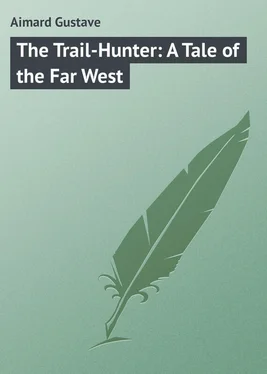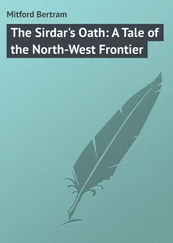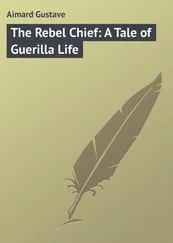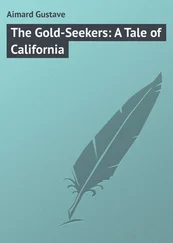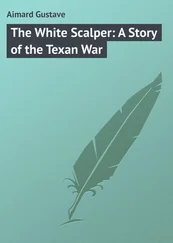Gustave Aimard - The Trail-Hunter - A Tale of the Far West
Здесь есть возможность читать онлайн «Gustave Aimard - The Trail-Hunter - A Tale of the Far West» — ознакомительный отрывок электронной книги совершенно бесплатно, а после прочтения отрывка купить полную версию. В некоторых случаях можно слушать аудио, скачать через торрент в формате fb2 и присутствует краткое содержание. Жанр: foreign_prose, на английском языке. Описание произведения, (предисловие) а так же отзывы посетителей доступны на портале библиотеки ЛибКат.
- Название:The Trail-Hunter: A Tale of the Far West
- Автор:
- Жанр:
- Год:неизвестен
- ISBN:нет данных
- Рейтинг книги:3 / 5. Голосов: 1
-
Избранное:Добавить в избранное
- Отзывы:
-
Ваша оценка:
- 60
- 1
- 2
- 3
- 4
- 5
The Trail-Hunter: A Tale of the Far West: краткое содержание, описание и аннотация
Предлагаем к чтению аннотацию, описание, краткое содержание или предисловие (зависит от того, что написал сам автор книги «The Trail-Hunter: A Tale of the Far West»). Если вы не нашли необходимую информацию о книге — напишите в комментариях, мы постараемся отыскать её.
The Trail-Hunter: A Tale of the Far West — читать онлайн ознакомительный отрывок
Ниже представлен текст книги, разбитый по страницам. Система сохранения места последней прочитанной страницы, позволяет с удобством читать онлайн бесплатно книгу «The Trail-Hunter: A Tale of the Far West», без необходимости каждый раз заново искать на чём Вы остановились. Поставьте закладку, и сможете в любой момент перейти на страницу, на которой закончили чтение.
Интервал:
Закладка:
This harangue was greeted as it deserved to be; that is, by yells of joy.
"Señores," Red Cedar continued, "the worthy monk who accompanies me will call down the blessing of Heaven on our enterprise; so kneel down to receive the absolution he is about to give you."
The bandits instantaneously dismounted, took off their hats, and knelt on the sand. Fray Ambrosio then repeated a long prayer, to which they listened with exemplary patience, repeating amen after each occasion, and he ended by giving them absolution. The rangers rose, delighted at being thus freed from the burden of their sins, and got into their saddles again.
Red Cedar then whispered a few words in Fray Ambrosio's ears, who bowed his head in assent, and immediately set out in the direction of the Hacienda de la Noria, followed by Andrés Garote. The squatter then turned to the rangers, who were awaiting his orders.
"You know where we are going, gentlemen," he said. "Let us start, and, before all, be silent, if we wish to catch our game in its lair; for you know that the Indians are as cunning as opossums."
The band started at a gallop, Red Cedar and his sons being at their head. It was one of those calm nights which predispose the soul to reverie, such as America alone has the privilege of possessing. The dark blue sky was spangled with an infinite number of stars, in the centre of which shone the majestic Southern Cross, sparkling like a king's mantle; the atmosphere was extraordinarily transparent, and allowed objects to be noticed at a great distance; the moon profusely spread around her silvery rays, which gave the scenery a fantastic appearance; a mysterious breeze sported through the tops of the great trees; and at times vague rumours traversed the space, and were lost in the distance.
The gloomy horsemen still went on, silent and frowning, like the phantoms of the ancient legends, which glide through the shadows to accomplish a deed without a name. At the end of scarce an hour the rancheria was reached. All were resting in the village – not a light flashed in the hut. The Indians, wearied with the hard toil of the day, were reposing, full of confidence in the sworn faith, and apprehending no treason.
Red Cedar halted twenty yards from the rancheria, and drew up his horsemen so as to surround the village on all sides. When each had taken his post, and the torches were lighted, Red Cedar uttered the terrible war cry of the Apaches, and the rangers galloped at full speed on the village, uttering ferocious howls, and brandishing the torches, which they threw on the cabins.
A scene of carnage then took place which the human pen is powerless to describe. The unhappy Indians, surprised in their sleep, rushed terrified and half naked out of their poor abodes, and were pitilessly massacred and scalped by the rangers, who waved with a demoniac laugh their smoking, blood-dripping scalps. Men, women, and children, all were killed with refinements of barbarity. The village, fired by the rangers' torches, soon became an immense funebral pile, in which victims and murderers were huddled pell-mell.
Still a few Indians had succeeded in collecting. Formed in a compact troop of twenty men, they opposed a desperate resistance to their assassins, exasperated by the odour of blood and the intoxication of carnage. At the head of this band was a half-nude, tall Indian of intelligent features, who, armed with a ploughshare, which he wielded with extreme force and skill, felled all the assailants who came within reach of his terrible weapon. This man was the cacique of the Coras. At his feet lay his mother, wife, and two children – dead. The unhappy man struggled with the energy of despair. He knew his life would be sacrificed, but he wished to sell it as dearly as possible.
In vain had the rangers fired on the cacique – he seemed invulnerable: not one of the bullets aimed at him had struck him. He still fought, and the weight of his weapon did not seem to fatigue his arm. The rangers excited each other to finish him; but not one dared to approach him.
But this combat of giants could not endure longer. Of the twenty companions he had round him on commencing the struggle, the cacique now only saw two or three upright: the rest were dead. There must be an end. The circle that inclosed the hapless Indian drew closer and closer. Henceforth it was only a question of time with him. The rangers, recognising the impossibility of conquering this lion-hearted man, had changed their tactics: they no longer attacked him, but contented themselves with forming an impassable circle round him, waiting prudently for the moment when the strength of the prey, which could not escape them, was exhausted, in order to rush upon him.
The Coras understood the intention of his enemies. A contemptuous smile contracted his haughty lips, and he rushed resolutely toward these men who recoiled before him. Suddenly, with a movement quicker than thought, he threw with extraordinary strength the ploughshare among the rangers, and bounding like a tiger, leaped on a horse, and clutched its rider with superhuman vigour.
Ere the rangers had recovered from the surprise this unforeseen attack occasioned in them, by a desperate effort, and still holding the horseman, the chieftain drew from his girdle a short sharp knife, which he buried up to the hilt in the flanks of the horse. The animal uttered a shriek of pain, rushed headlong into the crowd, and bore both away with maddening speed.
The rangers, rendered furious at being played with by a single man, and seeing their most terrible enemy escape them, started in pursuit; but with his liberty the Coras had regained all his energy: he felt himself saved. In spite of the desperate efforts the rangers made to catch him up, he disappeared in the darkness.
The cacique continued to fly till he felt his horse tottering under him. He had not loosed his hold of the horseman, who was half strangled by the rude embrace, and both rolled on the ground. This man wore the costume of the Apache Indians. The Coras regarded him for an instant attentively, and then a smile of contempt played round his lips.
"You are not a redskin," he said, in a hollow voice; "you are only a paleface dog. Why put on the skin of the lion when you are a cowardly coyote?"
The ranger, still stunned by the fall he had suffered, and the hug he had endured, made no reply.
"I could kill you," the Indian continued; "but my vengeance would not be complete. You and yours must pay me for all the innocent blood you have shed like cowards this night. I will mark you, so that I may know you again."
Then, with fearful coolness, the Coras threw the ranger on his back, put his knee on his chest, and burying his finger in the socket of his eye, gave it a sharp rotatory movement, and plucked out his eyeball. On this frightful mutilation, the wretch uttered a cry of pain impossible to describe. The Indian got up.
"Go!" he said to him. "Now I am certain of finding you again whenever I want you."
At this moment the sound of hoofs could be heard a short distance off: the rangers had evidently heard their comrade's cry, and were hurrying to his aid. The Coras, rushed into the bushes and disappeared. A few moments later the rangers came up.
"Nathan, my son!" Red Cedar shouted as he leaped from his horse and threw himself on the body of the wounded man. "Nathan, my firstborn, is dead!"
"No," one of the rangers answered; "but he is very bad."
It was really the squatter's eldest son whom the cacique had mutilated. Red Cedar seized him in his arms, placed him before him on the saddle, and the band started again at a gallop. The rangers had accomplished their task: they had sixty human scalps hanging from their girdles. The rancheria of the Coras was no longer aught save a pile of ashes.
Of all the inhabitants of this hapless village only the cacique survived; but he would suffice to avenge his brothers.
Читать дальшеИнтервал:
Закладка:
Похожие книги на «The Trail-Hunter: A Tale of the Far West»
Представляем Вашему вниманию похожие книги на «The Trail-Hunter: A Tale of the Far West» списком для выбора. Мы отобрали схожую по названию и смыслу литературу в надежде предоставить читателям больше вариантов отыскать новые, интересные, ещё непрочитанные произведения.
Обсуждение, отзывы о книге «The Trail-Hunter: A Tale of the Far West» и просто собственные мнения читателей. Оставьте ваши комментарии, напишите, что Вы думаете о произведении, его смысле или главных героях. Укажите что конкретно понравилось, а что нет, и почему Вы так считаете.
